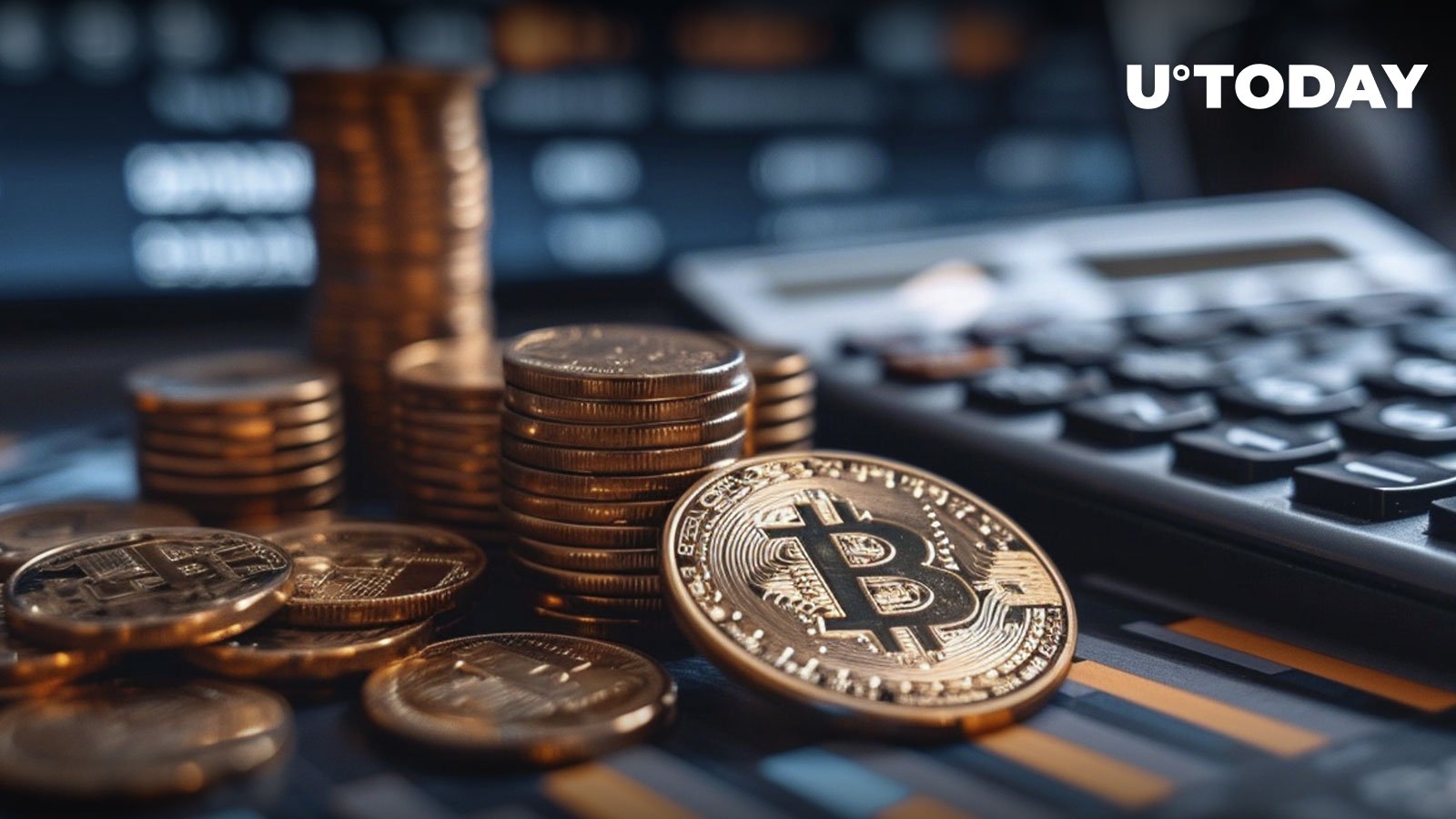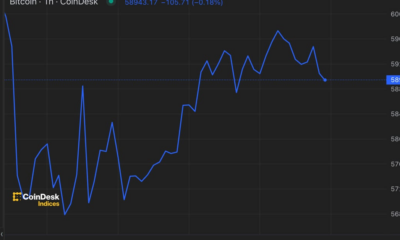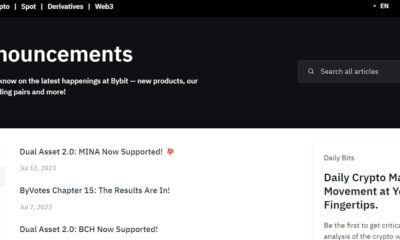News
US Cryptocurrency Taxes in 2024: IRS Proposed Regulations Explained

Continue reading U.TODAY
Google News
August 2023: proposed regulations
On August 25, 2023, the U.S. Treasury and the IRS released proposed regulations that would require companies engaged in digital asset-related services to file disclosure statements and provide beneficiary statements for digital asset-related provisions.
The proposed regulations provide clarification on several important aspects, including which digital assets are subject to reporting, who qualifies as a broker, how to calculate basis in a digital asset, and the treatment of digital assets as a separate category distinct from securities and commodities.
Source: Federal Register
“A key part of this effort fits into the IRS’ broader compliance focus on wealthy taxpayers. We must ensure that digital assets are not used to hide taxable income, and the proposed regulations are designed to provide clearer insight into assets of high-income individuals as well as others who use them,” said IRS Commissioner Danny Werfel.
The regulations define “digital asset intermediary” broadly, including entities such as trading platforms, wallet providers and payment processors. Under these proposed regulations, brokers would be tasked with reporting sales of digital assets, with an expanded definition of “digital asset.”
These regulations are expected to become effective for transactions occurring on or after January 1, 2025, with certain reporting aspects having later effective dates. It is important to note that these regulations are still in the proposal stage and may undergo further revisions.
Definition of digital assets and brokers
The proposed U.S. Treasury and IRS regulations expand the definition of reportable digital assets to include stablecoins, NFTs and tokenized stocks, excluding virtual assets limited to closed systems such as video game tokens.
A digital asset is a representation of value recorded on a secure, distributed ledger. Common types include:
- Convertible virtual currency and cryptocurrency (e.g. Bitcoin, Ethereum).
- Stablecoins, which are cryptocurrencies pegged to a stable asset such as a fiat currency (e.g., USD Coin, Tether).
- Non-fungible tokens (NFTs), unique tokens that represent ownership of digital assets such as works of art or collectibles.
- These digital assets serve various purposes within blockchain and digital finance systems.
The definition of “broker” is expanded to cover entities that provide “facilitation services” for the sale of digital assets, requiring detailed transaction reporting, including customer information and specifics of the sale.
Additionally, the Infrastructure Investment & Jobs Act expanded the definition of “broker” to include those who facilitate digital asset transfers for others. This applies to any digital representation of value recorded on a distributed ledger.
US tax experts have been vocal about the lack of clarity in current tax regulation. For example, proposed regulation § 1.6045–1(a)(21)(iii)(A) defines a facilitation service as any service that directly or indirectly enables the sale of digital assets. Excludes persons engaged solely in providing distributed ledger validation services, such as proof-of-work or proof-of-stake, without offering any other functions or services.
According to a Bloomberg law relationship, due to the lack of clarity, many stakers and staking companies are taking a conservative approach. They report the value of reward tokens as income when they are created, rather than when they actually receive income by selling their reward tokens.
Tracking crypto revenue via application forms
The IRS is now tracking cryptocurrency earnings by asking taxpayers on Form 1040 about their crypto assets. The form specifically asks whether people are engaged in receiving, selling, sending, exchanging or acquiring virtual currency. Providing false information can lead to penalties, as tax returns are legally binding declarations.
On January 22, 2024, the IRS remembered Taxpayers must answer a question about digital assets and report any related income when filing their 2023 federal tax return, similar to what is required for their 2022 tax return.
The question appears at the top of the forms:
- 1040Tax return for natural persons;
- 1040-SRUS Income Tax Return for Seniors;
- 1040-NRIncome Tax Return for Nonresident Aliens in the United States.
- 1041US Income Tax Return for Estates and Trusts;
- 1065US Return of Partnership Income;
- 1120US Corporate Income Tax Return;
- 1120-S, U.S. Income Tax Return for an S Corporation.
The Digital Assets question asks taxpayers whether, at any time during 2023, they received digital assets as a reward, prize, or payment for property or services, or whether they sold, exchanged, or otherwise disposed of a digital asset or financial interest in a digital resource.
The question may vary slightly depending on the type of taxpayer (individual, corporation, partnership or estate/trust). In addition to checking the box, taxpayers must report all income related to digital asset transactions.
April 2024: Draft Form 1099-DA
On April 18, 2024, the IRS submitted a draft Form 1099-DA aimed at calculating taxable profits or losses arising from intermediated digital asset transactions. This form includes token codes and wallet address fields, which are essential for reporting to both taxpayers and the IRS.
The 1099-DA form includes individual token codes, wallet address spaces, and details on how to locate transactions on the blockchain. Brokers are required to report digital asset arrangements on this form to both taxpayers and the IRS, potentially leading to recognized gains for taxpayers.
However, the cryptocurrency industry remains uncertain as to how the IRS will identify brokers subject to these regulations, particularly regarding different types of businesses such as kiosks, payment processors, and wallet providers. The absence of a formal digital asset registry complicates compliance for brokers, including centralized exchanges and decentralized platforms.
Digital asset intermediary problem
The broad definition of “digital asset intermediary” in the proposed regulation could involve multiple brokers in a single transaction. For example, if a user uses a self-hosted wallet with a DeFi platform for a token exchange, both the wallet provider and the DeFi platform could be considered intermediaries.
Unlike the securities rules, there is no exemption for multiple intermediaries, so each must file its own Form 1099-DA with the IRS and the taxpayer. This could confuse taxpayers, leading to over-reporting or discrepancies with IRS data, adding to the burden on taxpayers.
Additionally, the proposed rule’s portfolio-by-portfolio identification approach could pose a challenge to taxpayers who hold assets with low basis in specific portfolios. You may need to transfer high-basis assets to such wallets to identify them.
Cryptocurrency Brokers: Who Are They?
The Infrastructure Investment and Jobs Act, effective January 1, 2024, requires cryptocurrency brokers to report transactions over $10,000 to the IRS. This has sparked controversy due to perceived burdens and implementation challenges.
Brokers must file detailed reports with the IRS within 15 days of qualifying transactions, including sender information. The lack of guidance from the IRS leaves users uncertain about compliance, particularly regarding miners, validators, decentralized exchanges, and anonymous transactions.
Starting January 1, 2025, the proposed regulations would force brokers such as digital asset trading platforms, payment processors, and specific hosted wallet providers to report gross proceeds using Form 1099-DA and provide customers with beneficiary account statements .
Additionally, under certain conditions, brokers should include details of profit/loss and basis for sales occurring after January 1, 2026 in such returns and statements to assist clients with tax preparation.
According to PwC relationship, the IRS expects to receive an unprecedented volume of “eight billion” 1099-DA reports each year, with associated costs expected in the billions. Businesses will face challenges implementing the proposed regulations if the effective dates remain unchanged.
Cryptocurrency Industry Reaction to IRS
Variants Jake Chervinsky characterized the IRS’s proposed regulations as rules that “don’t make sense.”
He believes the IRS’s approach is driven by a perception of tax evasion, leading them to rely on financial surveillance. Chervinsky argues that the IRS is overlooking technology that enables peer-to-peer transactions without intermediaries capable of conducting KYC checks and reporting transactions.
Jason Schwartz, tax partner and co-head of digital assets at Fried Frank, noted that the new definition of digital asset broker does not help differentiate brokers.
On November 7, 2023, the DeFi Education Fund (DEF) filed a brief supporting James Harper’s appeal against the IRS, with the aim of limiting government access to users’ transaction history on cryptocurrency platforms.
Harper was one of thousands of Coinbase users whose data was disclosed to the IRS in 2017, prompting a legal challenge to strengthen digital privacy rights. DEF argues that the regulations proposed on August 27 would overbroaden the definition of “broker,” impose burdens on individuals and entities unable to comply, and jeopardize privacy.
Source: IRS.gov
IRS guidance sources
The processing of cryptocurrency is subject to limited guidelines, including:
News
Ether Drops Further After ETF Launch

Key points
- Spot ether ETFs began trading in the U.S. today, with the funds initially having more than $10 billion in collective assets under management.
- Analysts expect the launch of spot ether ETFs to have a net negative impact on the underlying price of ether in the near term, due to expected outflows from the pre-existing Grayscale Ethereum Trust.
- Spot Bitcoin ETFs continue to see strong inflows, with BlackRock’s IBIT alone seeing more than $500 million in inflows on Monday.
- Franklin Templeton, a spot ETF issuer on bitcoin and ether, has invested in a project that intends to bring Ethereum technology to Bitcoin.
Nine-point ether exchange-traded funds (ETFs)) started trading on the stock market on Tuesday, but all the optimism ahead of their approval did not translate into gains for the cryptocurrency markets.
Ether (ETH), the native cryptocurrency of the Ethereum blockchain, dropped less than 1% around the $3,400 level as of 1:30 PM ET, while Bitcoin (BTC) fell more than 2% to around $66,000.
Ether ETFs’ Debut Isn’t as Flashy as Bitcoin ETFs’
Spot ether ETFs began trading at just over $10 billion assets under management (AUM)), according to Bloomberg Intelligence analyst James Seyffart, most of that money is in the current Grayscale Ethereum Trust (ETHE) which has now been converted into an ETF.
“In the long term, Grayscale will simultaneously have the highest and lowest fees in the market. The asset manager’s decision to keep its ETHE fee at 2.5% could lead to outflows from the fund,” Kaiko Research said in a note on Monday.
Outflows from ETHE, if they occur, would be similar to those faced by Grayscale’s Bitcoin Trust (GBTC) after spot bitcoin ETFs began trading in January of this year, most likely due to high fees for the two original funds. Grayscale’s existing fund charges 2.5% fees, while a new “mini” ether ETF will charge 0.15% and commissions for other ETFs are set at 0.25% or less.
Such outflows could impact the price of ether and market sentiment.
“There could be a pullback shortly after the launch of Ethereum spot ETFs, i.e. outflows from Grayscale Ether Trust could dampen market sentiment in the short term,” Jupiter Zheng, a partner at Hashkey Capital’s liquid fund, told The Block.
But Grayscale remains optimistic.
“Compared to the splashy debut of spot bitcoin ETPs in January, the launch of ethereum ETPs has been relatively muted,” said Zach Pandl, Grayscale’s head of research, adding that investors may be “undervaluing” ether ETFs that are “coming to the U.S. market in tandem with a shift in U.S. cryptocurrency policy and the adoption of tokenization by major financial institutions.”
Bitcoin ETF Inflows Continue to Rise
As for bitcoin, there is clearly no lack of demand for spot ETFs, such as BlackRock’s iShares Bitcoin Trust (IBITS) recorded its sixth-largest day of inflows in its short history on Monday, at $526.7 million, according to data from Farside Investors. Daily inflows for the overall spot bitcoin ETF market also hit their highest level since June 5.
In particular, asset manager Franklin Templeton, which has issued both bitcoin and ether ETFs, appears to have decided to cover its back when it comes to Ethereum by investing in Bitlayer, a way to implement Ethereum technology on a second-layer Bitcoin network, according to CoinDesk.
News
Spot Ether ETFs Start Trading Today: Here’s What You Need to Know

Key points
- Spot ether ETFs will begin trading on U.S. exchanges on Tuesday. Nine ETFs will trade on Cboe BZX, Nasdaq and NYSE Arca.
- Ether ETFs offer investors exposure to the price of their underlying assets.
- Commissions on these new ETFs generally range from 0.15% to 0.25%.
- These ETFs do not provide exposure to Ethereum staking.
The U.S. Securities and Exchange Commission (SEC) has officially approved nine ether spots (ETH)exchange-traded funds (ETFs) for trading on U.S. exchanges. Trading for these new cryptocurrency investment vehicles begins today. Here’s everything you need to know.
What new ether ETFs are starting to trade today?
Spot ether ETFs starting trading today can be found at Quotation, NYSE Arkand Cboe BZX. Here’s a breakdown of each ETF you can find on these three exchanges, along with the fund tickers:
Cboe BZX will list the Invesco Galaxy Ethereum ETF (QETH), the 21Shares Core Ethereum ETF (CETH), the Fidelity Ethereum Fund (FETH), the Franklin Ethereum ETF (EZET) and the VanEck Ethereum ETF (ETHV).
Nasdaq will have the iShares Ethereum Trust ETF (ETHA) created by BlackRock, which also operates the largest spot bitcoin ETF under the ticker IBIT.
NYSE Arca will list the Bitwise Ethereum ETF (ETHW) and the Grayscale Ethereum Trust (ETHE). The Grayscale Ethereum Mini Trust (ETH), which will begin trading on the same exchange.
How does an ether ETF work?
Spot ether ETFs are intended to offer exposure to the price of ether held by the funds. Ether is the underlying cryptocurrency of the Ethereal network, the second largest crypto network by market capitalization.
ETF buyers are buying shares of funds that hold ether on behalf of their shareholders. Different spot ether ETFs use different data sources when it comes to setting the price of ether. Grayscale Ethereum Trust, for example, uses the CoinDesk Ether Price Index.
None of the ETFs launching today include pointed etherwhich represents a potential opportunity cost associated with choosing an ETF over other options such as self-custody or a traditional cryptocurrency exchange.
Ether staking currently has an annual return of 3.32%, according to the Compass Staking Yield Reference Index Ethereum. However, it is possible that the SEC will eventually approve Ether staking held by ETFs.
How can I trade Ether ETFs?
ETFs can simplify the trading process for investors. In the case of cryptocurrencies, instead of taking full custody of the ether and taking care of your own private keysSpot ether ETFs allow investors to purchase the cryptocurrency underlying the Ethereum network through traditional brokerage accounts.
Today, not all brokers may offer their clients spot ETFs on cryptocurrencies.
What are the fees for ether ETFs?
The fees associated with each individual spot ether ETF were previously revealed In the S-1 OR S-3 (depending on the specific ETF) deposit associated with the offerings. These fees are 0.25% or less for all but one.
The Grayscale Ethereum Trust, which converts to an ETF, has a fee of 2.5%. The Grayscale Mini Ethereum Trust has the lowest fee at 0.15%. These fees are charged on an annual basis for the provider’s management of the fund and are in line with what was previously seen with spot bitcoin ETFs.
Brokers may also charge their own fees for cryptocurrency trading.
News
Kamala Harris Odds Surge Amid $81M Fundraise. What Does It Mean for Bitcoin and Cryptocurrencies?

Market odds and memecoins related to US Vice President Kamala Harris have soared as the latest round of donations tied to the Democratic campaign raised $81 million in 24 hours, bolstering sentiment among some traders.
The odds of Harris being declared the Democratic nominee have risen further to 90% on cryptocurrency betting app Polymarket, up from 80% on Monday and setting a new high.
Previously, in early July, bettors were only betting on 8%, but that changed on Saturday when incumbent President Joe Biden announced he would no longer run in the November election. Biden then approved Harris as a candidate.
Polymarket traders placed $28.6 million in bets in favor of Harris, the data showsThe second favorite is Michelle Obama.
Somewhere else, Memecoin KAMA based on Solanaa political meme token modeled after Harris, has jumped 62% to set a new all-time high of 2 cents at a market cap of $27 million. The token is up a whopping 4,000% from its June 18 low of $0.00061, buoyed primarily by the possibility of Harris becoming president.
As such, Harris has yet to publicly comment on cryptocurrencies or her strategy for the growing market. On the other hand, Republican candidate Donald Trump has expressed support for the cryptocurrency market and is expected to appear at the Bitcoin 2024 conference on Saturday.
However, some expect Harris or the Democratic Party to mention the sector in the coming weeks, which could impact price action.
“While he has not yet received the official nomination, there is consensus that last night’s development is in line with current Democratic strategy,” cryptocurrency trading firm Wintermute said in a Monday note emailed to CoinDesk. “Keep an eye on Democrats’ comments on this issue in the coming days.
“The prevailing assumption is that Harris will win the nomination and any deviation from this expectation could cause market volatility,” the firm added.
News
Top 30x Cryptocurrency and Coin Presales Today: Artemis Coin at #1, Others Are: BlockDAG, 99Bitcoin, eTukTuk, and WienerAI

The cryptocurrency market has seen a lot of growth and imagination lately, with new ventures popping up regularly. A critical pattern in this space is the rise of crypto pre-sales, which give backers the opportunity to get involved with promising projects early on. Artemis is a standout option for crypto investors looking to expand their portfolios amid the many pre-sales currently underway.
Cryptocurrency presales, commonly referred to as initial coin offerings (ICOs), allow blockchain ventures to raise capital by offering their local tokens to early backers before they become available on open exchanges. Investors can take advantage of these presales by purchasing tokens at a lower price. If the project is successful and the token’s value increases, investors stand to receive significant returns.
>>> Explore the best cryptocurrency pre-sales to buy now <<
The Ultimate List of the Top 5 Cryptocurrency Pre-Sales to Invest In
- Artemis: The aim of Artemis (ARTMS) will become the cryptocurrency equivalent of eBay or Amazon. The upcoming Phase 4 will see the launch of the Artemis Framework, which will serve as a stage for digital money exchanges where buyers, sellers, specialized organizations and those seeking administration can participate in coherent exchanges.
- DAG Block: uses Directed Acyclic Graph technology to increase blockchain scalability.
- 99bitcoin: operates as a crypto learning platform
- WienerAI uses AI-powered trading bots for precise market analysis.
- eTukTuk focuses on environmentally sustainable transportation options, such as electric vehicle charging infrastructure.
We have determined that Artemis is the best new cryptocurrency presale for investment after conducting extensive research. It presents itself as the unrivaled cryptocurrency presale choice currently open.
>> Visit the best cryptocurrency pre-sale to invest in now <<
Top 5 Crypto Pre-Sales and Best Cryptocurrencies for Investment Today
Artemis (ARTMS) is attempting to establish itself as the cryptocurrency version of eBay or Amazon. The Artemis Crypto System, which will act as a platform for cryptocurrency transactions, will be launched in Phase 4. Buyers, sellers, service providers, and requesters will all benefit from seamless trading with this system. Customers will be able to purchase things, such as mobile phones using digital money, as well as sell products such as involved bicycles and get paid in cryptocurrency. Additionally, crypto money can be used to pay for administrations such as clinical consultations, legitimate care, and freelance work. Artemis Coin will act as the main currency of the ecosystem, with Bitcoin and other well-known cryptocurrencies from various blockchain networks backing it.
Artemis Coin has increased in price from 0.00055 to 0.00101 from 0.00094. Artemis may be attractive to individuals looking to recoup losses in Bitcoin, as predicted by cryptocurrency analysts. At this point, it seems to present an interesting presale opportunity.
>>> Visit the best cryptocurrency pre-sale to invest in now <<
The world of digital currency pre-sales is an exciting and exciting opportunity that could open the door to game-changing blockchain projects. Projects in this article, like Artemis Coin, offer the opportunity to shape the future of various industries and the potential for significant returns as the industry develops.
However, it is imperative to approach these investments with caution, thorough research, portfolio diversification, and awareness of the risks. You can explore the digital currency pre-sale scene with greater certainty and increase your chances of identifying and profiting from the most promising venture opportunities by following the advice and methods in this article.
>>> Join the best cryptocurrency pre-sale to invest in now <<
-

 News1 year ago
News1 year agoBitcoin (BTC) price recovery faces test on non-farm payrolls
-

 Bitcoin1 year ago
Bitcoin1 year ago1 Top Cryptocurrency That Could Surge Over 4,300%, According to This Wall Street Firm
-

 Altcoins1 year ago
Altcoins1 year agoOn-chain data confirms whales are preparing for altcoin surge with increased buy orders
-

 Bitcoin1 year ago
Bitcoin1 year agoThe US government may start accumulating Bitcoin, but how and why?
-

 News1 year ago
News1 year agoNew ByBit Listings for 2024: 10 Potential Listings
-

 News1 year ago
News1 year ago11 Best Crypto TikTok Accounts & Influencers in 2024
-

 Altcoins1 year ago
Altcoins1 year agoMarket giants have taken action!
-

 News1 year ago
News1 year ago11 Best Shitcoins to Buy in 2024: The Full List
-

 Ethereum1 year ago
Ethereum1 year agoTop Meme Coins by Market Capitalization in 2024
-

 News1 year ago
News1 year ago1.08 Trillion SHIBs Dumped on Major Crypto Exchange, What’s Going On?
-

 News1 year ago
News1 year ago19 Best Crypto Games to Play in 2024
-

 Altcoins1 year ago
Altcoins1 year agoAltcoin Recommended by Crypto Expert for Today’s Portfolio





